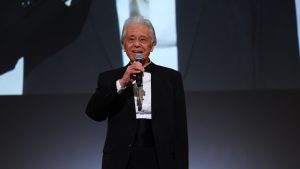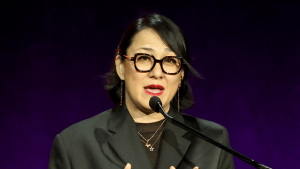
In her directorial debut Eleanor the Great, Scarlett Johansson tries to shape a portrait of aging, loneliness and grief in America through the misadventures of her eponymous protagonist, played by the reliably funny June Squibb (Thelma). You want Eleanor the Great to succeed because of its charming lead and compelling premise (the screenplay is by Tory Kamen), but it struggles to find its groove. The film lurches between comic set pieces and more dramatic beats, and while Johansson proves a competent helmer, it’s not enough to overcome some dizzying tonal imbalances. Still, at the very least, Eleanor the Great offers a character-driven break from the glut of sequels, prequels and whatever else studios squeeze out of existing IP.
The film, which premiered in the prestigious Un Certain Regard sidebar, strikes me as a peculiar choice for Cannes. A more fitting venue for this feel-good movie might have been Sundance or TIFF; its strengths recall the mid-budget comedy-dramas of the 90s — charismatic lead, relatively strong supporting actors and a story that’s comforting in its predictability and mandatory suspension of disbelief.
Eleanor the Great
The Bottom Line

Compelling premise, uneven execution.
Venue: Cannes Film Festival (Un Certain Regard)

Cast: June Squibb, Erin Kellyman, Jessica Hecht, Rita Zohar, Chiwetel Ejiofor
Director: Scarlett Johansson
Screenwriter: Tory Kamen
Rated PG-13,

1 hour 38 minutes
The film follows Eleanor Morgenstein (Squibb), a 94-year-old woman forced to return to New York and move in with her daughter Lisa (Jessica Hecht) after her best friend Bessie (Rita Zohar) unexpectedly dies. The transition proves difficult when the nonagenarian realizes that no one has any time for her. In an attempt to find community, Eleanor looks for activities at her local Jewish Community Center, where her daughter has signed her up for singing classes. An awkward misunderstanding lands her in a group for Holocaust survivors, and instead of correcting the mistake, Eleanor adopts her dead best friend’s Holocaust survival stories as her own. This leads Eleanor to befriend Nina (Erin Kellyman), a 19-year-old journalism student who wants to write about Eleanor’s experiences.

It’s a bold premise that could have worked better. Eleanor the Great attributes the titular character’s dubious actions to grief and isolation. But that framing isn’t asserted early or forcefully enough to be convincing, so what might have been a fascinating and somber study of an elderly woman seeking connection after the death of her closest friend becomes an uneven and sometimes trying chronicle of a pretty weird scheme. Stronger and more meaningful points in the film involve Eleanor undergoing a second coming of age by preparing for the bat mitzvah she never had as a child and striking up a friendship with Nina.
Eleanor the Great opens with a great sequence that establishes Eleanor and Bessie’s life together. The two women have been friends for decades and decided to share a small house in Florida after their respective husbands died. Their routines include early morning chats over coffee, weekly runs to the grocery store and watching their favorite anchor Roger (Chiwetel Ejiofor) on the evening news.
Johansson’s direction is assured here, establishing the intimacy between these two older women with the kind of endearing eye usually reserved for stories about girlhood. These and some other, later moments in the film reminded me of how Sarah Friedland captured aging as its own coming-of-age in her brilliant debut Familiar Touch. Working with DP Hélène Louvart (La Chimera), Johansson, like Friedland, represents becoming an elder as an equally energizing chapter of adulthood.
When Bessie dies, Eleanor is gutted and feels unmoored. More scenes of the nonagenarian grappling with the realities of that mourning would have strengthened the film by offering a more persuasive foundation for her later decisions. Instead, Johansson moves quickly, and before we know it Eleanor is returning to New York to live with her daughter and grandson Max (Will Price). It doesn’t take long for her to realize that neither Lisa, who is reeling from a divorce, nor Max, a teenager, has much time for her.
Eleanor ends up at the Holocaust survivor group by complete accident, but she doesn’t remedy the misunderstanding, because she prefers the community within that group to the theater adults in the singing class Lisa signed her up for. In a spur-of-the-moment decision, when prompted to introduce herself, she adopts Bessie’s biography as her own.

Nina, a journalism student looking for her next story, is deeply moved by Eleanor’s falsified narrative about escaping from Poland and coming to the U.S. Although Eleanor initially rejects Nina’s pleas for a profile, the cub reporter’s persistence pays off. The two embark on a sweet friendship that I wish had more time to gestate. Nina’s mother, who was Jewish, recently died, and her father (who Eleanor doesn’t know is the news anchor, Roger) is too subsumed by his own sadness to pay attention to her, so the relationship with Eleanor becomes a source of real comfort.
The comedic elements of Eleanor the Great work mostly because of Squibb’s solid performance as the sometimes cantankerous and slightly overbearing mother. At 94, her character is still relatively independent and spiky, and it’s funny to watch her snap at younger people who assume otherwise.
Things start to get shaky when Johansson dials down the comedy to lean into more serious turns. The shift is bumpy in part because the performances don’t align with the new, theoretically heightened stakes of the story. Eleanor’s dishonesty puts her in more precarious situations, including having to speak to journalism students about ethical storytelling and a local news channel’s interest in airing a segment about her.
The introduction of an additional thread about Roger and Nina’s relationship is sweet, but doesn’t have much time to develop, which only highlights how underused Ejiofor and Kellyman are. These new plotlines clutter up Eleanor the Great where condensing might have been a better choice. Most disappointingly, we never really get a good sense of Eleanor’s interior life, which means that the film’s ambitions ultimately feel unfulfilled.
#June #Squibb #Scarlett #Johanssons #Debut






